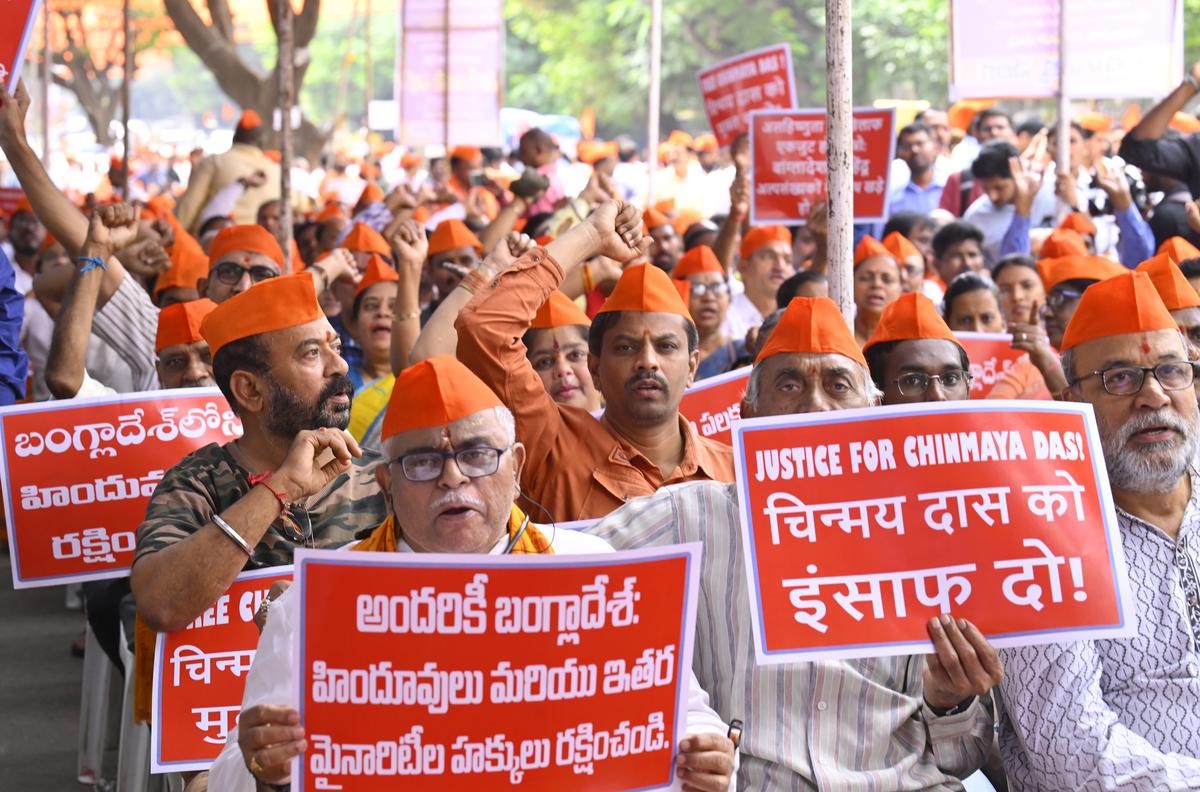
The bail hearing, held under stringent security measures, was presided over by Chattogram Metropolitan Sessions Judge Md Saiful Islam. After approximately 30 minutes of deliberation, the judge rejected the bail plea, despite the defense mounted by a team of 11 Supreme Court lawyers who had traveled from Dhaka to represent Das.
The sedition charges against Das stem from an incident on October 25, 2024, during a rally in Chattogram. It is alleged that participants hoisted a saffron flag associated with ISKCON above Bangladesh's national flag at the Independence Monument in the New Market area, an act perceived as a serious affront to national symbols.
Following his arrest at Hazrat Shahjalal International Airport in Dhaka, Das was presented before the Chattogram Sixth Metropolitan Magistrate's Court on November 26, where his initial bail application was denied. The court ordered his detention, leading to protests by his followers outside the court premises. These demonstrations escalated into violent clashes with law enforcement, resulting in the death of a lawyer named Saiful Islam Alif.
The unrest has prompted significant concern among legal professionals and minority communities in Bangladesh. The Chattogram District Bar Association, led by President Nazim Uddin Chowdhury, criticized the authorities for failing to prevent the violence and called for enhanced security measures to protect legal practitioners.
The situation has also drawn international attention. India's Ministry of External Affairs expressed deep concern over the escalating violence and the arrest of Das, emphasizing the need to ensure the safety and security of minority communities in Bangladesh. In response, Bangladeshi authorities have maintained that the issue is an internal matter, while assuring that due process is being followed.
The arrest and subsequent denial of bail for Das have intensified discussions about the treatment of minority groups in Bangladesh. Human rights organizations and minority advocacy groups have called for a fair and transparent legal process, urging the government to address underlying tensions that have led to such incidents.
As the legal proceedings continue, the case of Chinmoy Krishna Das remains a focal point in the broader discourse on religious freedom and minority rights in Bangladesh. The government's handling of the situation will likely have significant implications for the country's social harmony and international relations.
The court's decision to deny bail underscores the gravity with which the Bangladeshi legal system views charges related to national symbols and sedition. It also reflects the complexities involved in balancing national security concerns with the rights of individuals and minority communities.
Observers note that the outcome of this case could set a precedent for how similar cases are handled in the future, potentially influencing the legal landscape concerning freedom of expression and religious practices in Bangladesh.
In the meantime, the legal team representing Das has indicated plans to appeal the decision, seeking relief from higher judicial authorities. The situation remains fluid, with both national and international stakeholders closely monitoring developments.
The denial of bail to Chinmoy Krishna Das highlights the ongoing challenges faced by religious minorities in Bangladesh. It calls attention to the need for dialogue and policy measures aimed at ensuring the protection of minority rights within the framework of the country's legal and constitutional provisions.
As tensions persist, the international community continues to advocate for peaceful resolution and adherence to human rights standards, emphasizing the importance of upholding justice and equality for all citizens, regardless of religious affiliation.
The case serves as a reminder of the delicate balance between maintaining national unity and respecting the diverse cultural and religious fabric that constitutes Bangladesh's society. The coming days will be critical in determining the direction of this balance and the broader implications for the nation's commitment to pluralism and inclusivity.
In light of these developments, stakeholders are calling for calm and restraint from all parties involved, urging a focus on constructive dialogue and legal processes to address the underlying issues at hand. The path forward will require careful navigation to ensure that justice is served while preserving the social cohesion that is vital for Bangladesh's continued progress.
The denial of bail to Chinmoy Krishna Das marks a significant juncture in the ongoing discourse surrounding minority rights and legal justice in Bangladesh. The outcomes of this case are poised to have lasting impacts on the nation's approach to religious freedom and the protection of its diverse communities.
As the situation evolves, it remains imperative for all stakeholders to engage in open and honest dialogue, fostering an environment where the rights and freedoms of every citizen are respected and upheld in accordance with the principles of justice and equality.
The international community continues to watch closely, with hopes that Bangladesh will navigate this complex issue in a manner that reinforces its commitment to human rights and the rule of law.
The case of Chinmoy Krishna Das stands as a pivotal moment in Bangladesh's journey toward ensuring the equitable treatment of all its citizens, regardless of religious or cultural affiliations. The decisions made in the coming days will be instrumental in shaping the nation's future trajectory concerning human rights and social harmony.
